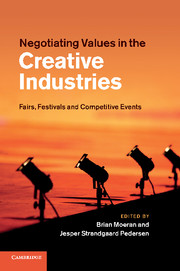Book contents
- Frontmatter
- Contents
- Figures
- Tables
- Contributors
- Acknowledgements
- Introduction
- 1 A Salon’s life
- 2 Art fairs
- 3 Biennalization and its discontents
- 4 Staging auctions
- 5 The book fair as a tournament of values
- 6 Inventing universal television
- 7 Transforming film product identities
- 8 Event institutionalization and maintenance
- 9 Tradition and transformation at the Fan Fair festival
- 10 Between art and commerce
- 11 Configuring sustainability at fashion week
- 12 An inconvenient truce
- 13 The retrospective use of tournament rituals in field configuration
- Afterword Converting values into other values
- Author index
- Subject index
- References
8 - Event institutionalization and maintenance
the Annecy animation festival 1960–2010
Published online by Cambridge University Press: 25 October 2011
- Frontmatter
- Contents
- Figures
- Tables
- Contributors
- Acknowledgements
- Introduction
- 1 A Salon’s life
- 2 Art fairs
- 3 Biennalization and its discontents
- 4 Staging auctions
- 5 The book fair as a tournament of values
- 6 Inventing universal television
- 7 Transforming film product identities
- 8 Event institutionalization and maintenance
- 9 Tradition and transformation at the Fan Fair festival
- 10 Between art and commerce
- 11 Configuring sustainability at fashion week
- 12 An inconvenient truce
- 13 The retrospective use of tournament rituals in field configuration
- Afterword Converting values into other values
- Author index
- Subject index
- References
Summary
Over the years, I have watched the [Annecy] festival change and grow from a celebration of short independent animation into a big money marketplace where feature films are slowly but surely becoming the star of the show. Major deals are made at MIFA. At first I resented the changes but I have come to accept them. As an industry we do need one major event a year that is all about business. This allows other festivals to retain their character as celebrations of animation as a great form of art.
Denney-Phelps (2009)This chapter addresses event institutionalization and maintenance in a study of the annual Annecy International Animation Film Festival and the International Animation Film Market (MIFA), a major event in the global animation industry. Since its creation in 1956, this event has evolved from a community-oriented gathering of artistically oriented animation film auteurs into a global event featuring aesthetic, technological and business innovations, as well as into a platform for the discovery and recruitment of creative talent. The chapter seeks to highlight the processes that have led to event institutionalization and enabled institutional maintenance. In so doing, it responds to recent calls to study ‘mechanisms that serve to prevent dissipation and eventual deinstitutionalization’ (Dacin and Dacin, 2008: 348).
Events which play a role in the configuration of organizational fields by providing arenas for processes of institutionalization and institutional change have recently been conceptualized as ‘field-configuring events (FCEs)’ (Lampel and Meyer, 2008). While there is growing empirical evidence that such events contribute to the emergence of field-wide institutions and provide institutional entrepreneurs with opportunities to challenge and redefine institutions, little is known about the processes by which such events themselves become institutionalized. A high degree of institutionalization characterizes many of the FCEs presented in the empirical literature, including the Grammy awards (Anand and Watson, 2004), the Booker Prize (Anand and Jones, 2008), the Olympic Games (Glynn, 2008) and the Salon in the nineteenth-century French art field (see Chapter 1 by Delacour and Leca in this volume) – all of which are strongly embedded in systems of norms and regulations, and largely taken for granted by actors within their respective fields.
- Type
- Chapter
- Information
- Negotiating Values in the Creative IndustriesFairs, Festivals and Competitive Events, pp. 197 - 223Publisher: Cambridge University PressPrint publication year: 2011
References
- 8
- Cited by



